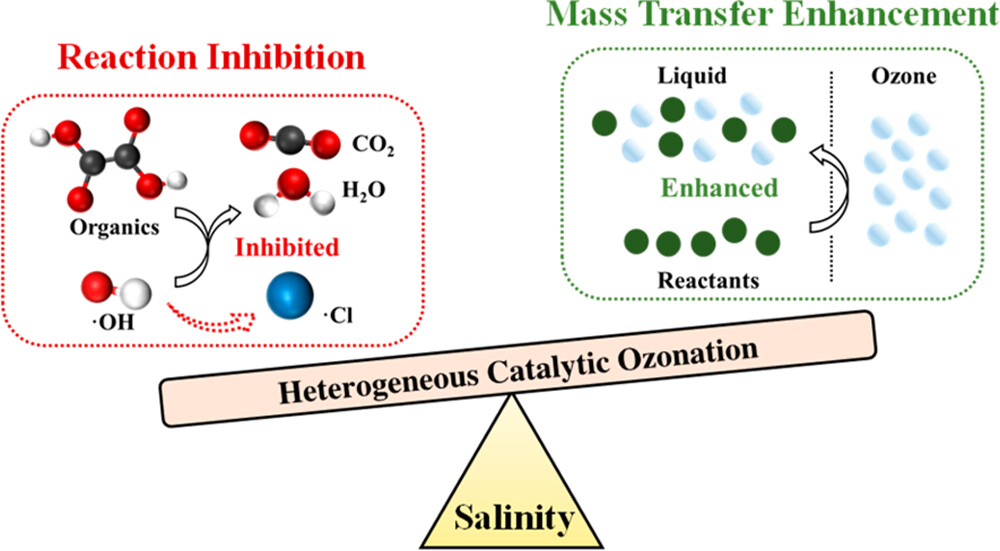Recently, the research team led by Xiaoyuan Zhang, an associate professor from the School of Environment at Tsinghua University, has made new progress in the field of catalytic ozonation of saline wastewater. Their recent work revealed the trade-off effect between reaction inhibition and mass transfer enhancement induced by salinity, which provided a new analytical perspective to explain the controversies over the effects of salinity on organics removal and established a new theoretical framework to understand the role of inorganic salts in heterogeneous catalytic ozonation.

Fig.1 Schematic of the trade-off between reaction inhibition and mass transfer enhancement in heterogeneous catalytic ozonation
Heterogeneous catalytic ozonation is an effective technology for advanced wastewater treatment, while the influence of coexisting salts remains controversial. The recent work from Prof. Xiaoyuan Zhang’s research group revealed the trade-off effect between reaction inhibition and mass transfer enhancement induced by salinity, and proposed that the trade-off could directly affect the pollutants degradation pattern under varying salinity. On the one hand, the increase of salinity would lead to the decrease of ozone solubility and the futile consumption of ozone and hydroxyl radicals, thereby triggering significant inhibition on catalytic reactions. On the other hand, the increase of salinity can effectively suppress ozone bubble coalescence and improve the gas-to-liquid mass transfer coefficient and the intra-liquid mixing efficiency, therefore inducing strong enhancement on the mass transfer side.
Reaction inhibition and mass transfer enhancement would form a trade-off in the continuous aeration system, collectively affecting the oxalate degradation pattern under varying salinity. The trade-off shifted under different pH values and aerator pore sizes, and the oxalate degradation pattern would change correspondingly. This work provided a new analytical perspective to explain the controversies over the effect of salinity on organics removal and established a new theoretical framework for understanding the role of inorganic salts in heterogeneous catalytic ozonation.
The paper "Revisit the Role of Salinity in Heterogeneous Catalytic Ozonation: The Trade-off between Reaction Inhibition and Mass Transfer Enhancement." was published in the well-known journal Environmental Science & Technology.
Prof. Xiaoyuan Zhang is the corresponding author of the paper. Kechao Lu, a master’s student of Class 2021 from the School of Environment, Tsinghua University, is the first author. The coauthors of the paper include Prof. Xia Huang, PhD students Tengfei Ren and Ni Yan from the School of Environment, Tsinghua University.
Paper Link:https://pubs.acs.org/doi/full/10.1021/acs.est.3c00595